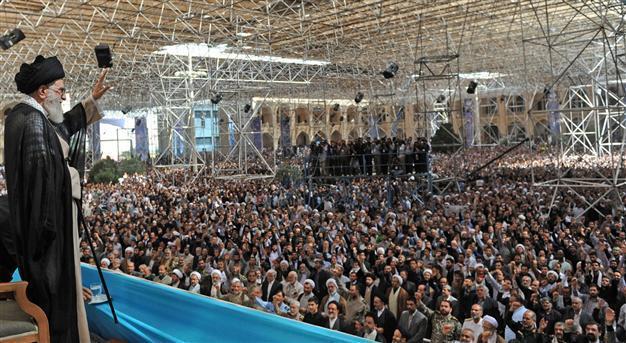Pressure holding Iran back from bomb decision: Israel
JERUSALEM - Agence France-Presse

A handout picture released by the official website of the Iranian supreme leader Ayatollah Ali Khamenei shows him waving to the crowd before delivering a speech during the 23rd anniversary of the death of the late founder of the Islamic Republic Ayatollah Ruhollah Khomeini, at his mausoleum in a suburb of Tehran on June 3, 2012. AFP photo
International pressure is forcing Iran to hold off on a decision about whether to make the dash to develop nuclear weapons, Israel's military chief of staff said on Tuesday.
"Iran is striving for nuclear military ability, but has not yet reached the decision to cross the threshold, for its own strategic considerations," Lieutenant General Benny Gantz told MPs at the parliamentary committee on foreign affairs and defence.
"The international isolation, pressure, sanctions, a reliable military threat -- and for that you have to be super-ready -- all of that can cause the Iranians to decide to say 'not now' as far as crossing the threshold," he said in remarks relayed by the committee spokesman.
Iran has already developed the capacity to enrich uranium to 20 percent, which is used to create medical isotopes, but going "the extra mile" would mean working to enrich to 90 percent -- the level needed to make nuclear weapons.
Tehran is under huge pressure from a raft of international sanctions imposed on its oil and banking sectors over its disputed nuclear programme.
And Israel, which sees a nuclear Iran as an existential threat, has refused to rule out a pre-emptive military strike on its nuclear facilities.
Tehran denies its intentions are anything but peaceful.
In April, Gantz told Israel's Haaretz newspaper that he did not believe Iran would take the decision to build a nuclear bomb.
"It still hasn't decided yet whether to go the extra mile," he told the paper.
World powers have held two rounds of talks with Iran aimed at convincing the Islamic Republic to roll back its nuclear programme, which Israel and much of the West believes is a front for developing atomic weapons.
So far, the negotiations have not produced any tangible results although a third round is due to take place in Moscow later this month.
"The only people who can decide to relinquish the nukes are the Iranians themselves, and as an army we should be ready for that too," Gantz said, without elaborating.
